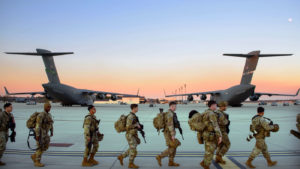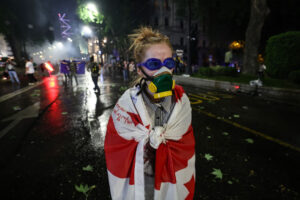In the summer of 2019, I took one of Beirut’s vintage Mercedes taxis to the city’s southern suburbs. I was in Dahieh to meet Lokman Slim, a prominent Lebanese researcher and fierce critic of Hezbollah. Slim, together with his German-born wife, lived and worked in a villa right under the group’s nose. I, like many locals, wondered how Slim was tolerated amid Dahieh’s rows of dense beige apartment blocks, less than a mile away from the infamous auditorium where Hezbollah broadcasts Hassan Nasrallah’s speeches to the world.
The quiet stillness of Slim’s villa, its libraries, its garden — all were a refuge from the hustle and bustle of Dahieh beyond. Slim, for his part, offered me coffee as we discussed Lebanon’s complex political existence, apparently unconcerned by his powerful armed neighbours. Yet less than two years later, in February 2021, he was dead, murdered by unknown assailants in his car outside Beirut. Though no perpetrators were ever identified, the assassination was obviously carried out by Hezbollah or one of its affiliates. Slim, like every Shi’a Muslim living in Dahieh, was ultimately swallowed by it.
This is the reality for many people in Hezbollah-dominated areas of Lebanon: sooner or later, you’ll either need to tie your existence to the group, or else be consumed by it. This was made plain by Israel’s pager and walkie-talkie attacks last week, when communication devices exploded in supermarkets, offices, homes, and funerals across Dahieh, south Lebanon, and the Beqaa Valley, leaving no corner of Hezbollah’s state-within-a-state untouched.
Commentary on this revolutionary event has largely fallen into one of two camps. While some have derided the pager operation as an indiscriminate attack on civilians, others have noted that those who carried pagers distributed by Hezbollah were by default bonafide members of the organisation.
The truth, however, is that both these viewpoints are accurate simultaneously. Hezbollah in 2024 is not just a militia fighting Israel — it is an entire parallel society, boasting a political party, a social welfare system and charitable religious institutions, alongside five hospitals and hundreds of medical centres. Even the Beirut International Airport and the city’s commercial seaport have for years been under Hezbollah’s sway.
Altogether, these institutions serve a living, breathing, multi-religious patchwork of communities. As Lebanon has weathered financial ruin, disasters like the 2020 port explosion, and the intransigence of the country’s sectarian politics, the Lebanese government has slowly collapsed, taking many social services with it. This has pushed Lebanese Shi’a, Hezbollah’s primary constituency, even closer to the group, where they’ve been able to provide much more for adherents than the state itself. Examples abound. As pharmaceutical supplies dried up amid Lebanon’s economic crisis, Hezbollah was able to provide life-saving medication smuggled in from Syria and Iran to people living under its rule. As the value of the Lebanese lira plummeted, it opened supermarkets for its constituents that sold Iranian goods at lower prices than the competition.
The majority of those killed in the pager attacks were indeed Hezbollah fighters. Yet hundreds of people — working as medics and teachers, mechanics and shopkeepers — were wounded too. Though they’d never held a rifle in service of the group, and were by most definitions civilians, they too were caught in the crossfire: Hezbollah’s hold on their daily lives was just too tight. It’s a situation with parallels elsewhere, with Hamas in Gaza, the Taliban in Afghanistan, and drug cartels in Latin America playing a similar social function.
Nor is all this merely relevant to Lebanon’s internal dynamics. Deciding where to draw the line between combatant and civilian has been and continues to be a vital matter in conflicts involving non-state actors, blurring as they do the line between guerilla movement and quasi-government. But with Israel seemingly setting the stage for an all-out war with Hezbollah — having now conducted hundreds of air strikes north of the border, which collectively have resulted in the single deadliest day in Lebanon since hostilities began last year — this unresolved ambiguity will continue to produce deadly consequences for the Lebanese people. To put it bluntly: many risk finding themselves declared guilty by association with Hezbollah and its vast, multifaceted network.
As the last year of warfare in Gaza has made clear to the world, Israel has little problem with inflicting devastating civilian casualties to achieve its battlefield goals. Indeed, the policy of bringing maximum pressure to bear on Hamas and Gaza was itself born in Lebanon. In 2006, the IDF smashed civilian infrastructure to bring Hezbollah to heel, ultimately producing the infamous Dahieh doctrine. Since the start of the current round of fighting, now almost a year old, Israel has hit Hezbollah-linked rescue teams, as well as the group’s medical services. This suggests that, for Israel, the distinction between civilian branches of Hezbollah’s infrastructure and its military wing is already null and void.
From a purely military perspective, this brutal policy is understandable. All branches of Hezbollah’s network feed into the same coffers. These play a part in funding its armed wing, so working to incapacitate the entire organisation does make sense for Israel strategically, despite the immense ethical caveats involved. But then the question emerges: how far is Israel willing to go? Who, to put it bluntly, will it decide is contributing to Hezbollah’s operations — and therefore get a target on their back? Nor are random civilians the only ones at risk here. Since 1992, after all, Hezbollah has held seats in the Lebanese parliament, and is currently part of the country’s governing coalition. Though Israel apologised for killing a member of the Lebanese Armed Forces in late 2023, IDF commanders have previously stated that they wouldn’t distinguish between Hezbollah and the formal state in any future war.
Over the past year analysts have often noted that while Israel may have achieved tactical victories against Hezbollah — notably the pager attack or the recent killing of Ibrahim Aqeel — it has no strategic vision beyond these triumphs. The closest thing they have is the belief, apparently held by many within Israel’s national security and military leadership since October 7, that deploying overwhelming force will awe its enemies into capitulating. This calculus has in effect produced a policy of collective punishment against Palestinians in Gaza and the West Bank for their closeness — voluntary or not — to Hamas. As we’re now seeing, Shi’a Muslims in Lebanon are now suffering a similar fate thanks to their (often unwanted) relationship with Hezbollah.
From Fifties British Kenya, to post-2011 Syria, where powerful actors tried to tame guerilla forces and the restive populations that supported them, history shows that such a strategy is doomed. Basic group psychology agrees. In Lebanon, punishing people who just happen to be under Hezbollah’s thumb will do nothing but strengthen Nasrallah’s authority, and personalise support for a group that was hitherto more abstract. In the event that Hezbollah can be defeated militarily — and with some 20,000 active personnel and over 100,000 missiles, that’s no sure thing — that inevitably means Lebanese antipathy toward Israel will linger. That, in turn, offers space to new rogue actors, especially in the absence of a fully functioning state.
A brave new generation of Lokman Slims can only appear when Lebanese Shi’a can choose which political group they associate with. Hezbollah’s stifling repression is the most significant obstacle stopping this happening — but how Israel behaves is crucial too. If people working regular jobs in suburbs like Dahieh can expect to be attacked no matter what they do, why bother resisting Hezbollah at all?
Disclaimer
Some of the posts we share are controversial and we do not necessarily agree with them in the whole extend. Sometimes we agree with the content or part of it but we do not agree with the narration or language. Nevertheless we find them somehow interesting, valuable and/or informative or we share them, because we strongly believe in freedom of speech, free press and journalism. We strongly encourage you to have a critical approach to all the content, do your own research and analysis to build your own opinion.
We would be glad to have your feedback.
Source: UnHerd Read the original article here: https://unherd.com/



